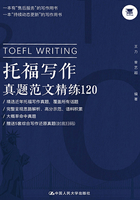
22. (20170226) Rather than helping their children do schoolwork, parents should encourage their children to do schoolwork independently.
头脑风暴
家长应该帮助孩子做作业,还是让他们独立完成?
帮孩子:
培养更好的亲子关系。
防止孩子在一个问题上纠结太长时间。
让孩子感受到家长的支持。
独立完成:
培养孩子探究的意识。
防止孩子依赖家长。
锻炼孩子主动发现问题的能力,而不是被动接受帮助。
范文思路
论点:独立完成。
理由一:可以逐渐培养孩子探究问题的意识。
理由二:培养孩子的自主性,防止过度依赖家长。
理由三:自己主动寻求帮助,而非被动接受帮助。
范文文本
As we are living in an era with ever accelerating development of science and technology, the materials students are required to master at school have also had a steep increase in difficulty. As a result, some parents tend to help their children with their schoolwork while others contend that the children are supposed to finish schoolwork independently. Personally, I tend to agree with the latter in that I believe finishing homework independently can contribute greatly to a child's overall development.
First of all, by stepping aside, parents can foster their children's ability to explore the academic problem they find challenging. For example, if a student gets stuck with a problem about objects falling towards the earth while considering air resistance, which is a subject untaught by teachers at school, he/she would have to study the related knowledge in mathematics in order to understand the Wikipedia entry of that subject. Then, by perusing the material he/she has found online or in another textbook, he/she deepens his/her understanding in this subject, and finally, he/she makes another attempt to solve the problem at hand. If he/she still finds it challenging, then he/she would start the aforementioned process again until he/she finally solves it. This process sounds intimidating and exhausting, but this is very similar to how researchers solve problems. By meddling with their children's study, parents are robbing their children of opportunities to master and practice this technique of active learning, which could have given them a distinct advantage academically.
Second of all, by allowing their child to solve problems without their help, parents are raising a more independent child. Suppose the parents helped their child finish his/her math homework, the next day, he/she would probably need help with his/her English homework. If this becomes a regular situation, it is likely that this child will have to depend on his/her parents for everything that he/she fails to do on his/her first try. In addition, I am fairly certain that there will come a day when his/her parents can no longer solve his/her problems for him/her, and he/she would end up confused and devastated rather than pulling up his/her sleeves and making effort until solving them. According to a research project done by University of Southern California, about 80% of the children who did not receive any academic help from their parents turned out to be able to live independently at the age of 18 while about 60% of the children who received large amount of parental help could not live without their parents after they graduate from college.
Last but not least, some may be concerned that children could get stuck with one particular problem and spend an enormous amount of time tackling it without any result, and eventually become frustrated and loose their confidence. Admittedly, this is quite common among children, but instead of parents' offering help, there is a better solution. Parents could encourage their children to actively seek outside help rather than passively receiving aid. With the popularization of smart phones, children nowadays have easy access to their teachers at school as well as to their classmates. As a result, they can conveniently reach out to their teachers and classmates for help should they encounter an obstacle which they cannot pass.
In a nutshell, I do believe that instead of stepping in and offer help with their children's schoolwork, parents should allow children to solve problems independently as it can bring about such wonderful outcomes.
语料积累
stepping aside 让开,站在一边,不插手
rob sb. of 抢走,剥夺
master 掌握
on one's first try 在第一次尝试时
pull up one's sleeves 捋起袖子(准备做事情)
make effort 做出努力
be concerned that 担忧
tackle 解决,应付
have access to 有使用权,可以接近
should… 如果(should anything happen, call me)
bring about 引起,带来